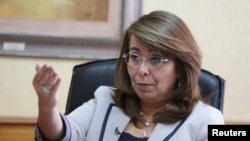Nongovernmental organizations fear a draft law in Egypt will roll back freedoms won in the 2011 uprising and could threaten their existence, but the country’s minister of social solidarity is urging them not to prejudge the measure.
Ghada Wali said the draft was open to revision and could be amended by parliament, which she hopes will pass the law after elections expected later this year.
Speaking Thursday at the ministry building in Cairo, Wali said harsh criticism of the proposed law by NGOs was premature, given that the latest version has not yet been made public.
Civil society groups had charged that an earlier draft would strengthen security services' hand to control them. They worry that ambiguous language could be used to prevent groups from operating and harshly punish those that do.
Earlier drafts have also been hostile to foreign NGOs and groups receiving foreign funds, they said, prompting at least one organization, the Carter Center, to leave Egypt.
Mistrust of government
The NGO law has gone through multiple iterations since mass protests toppled Hosni Mubarak from the presidency in 2011.
Civil society groups, many of which played a key role in that uprising and flourished in its aftermath, have felt increasingly targeted since 2012, when Egypt closed down a handful of high-profile pro-democracy groups and began giving closer scrutiny to foreign funding of some organizations.
Now NGOs feel threatened by what many see as a creeping legal restrictions on political freedoms won in the 2011 revolt. Their concerns reflect a historical mistrust of government, which has often restricted their operations under the guise of rule of law.
Wali, a former representative at the U.N. Development Program, insisted the latest draft law incorporated civil society's concerns. She declined to comment on its contents but said she expected it would be more flexible.
“What we are committed to is that this NGO draft ... will be in line with the Egyptian constitution, will be in line with all international treaties that Egypt is a signatory of and will be in adherence with the best practices,'' she said.
Wali's reassurances may not be enough to assuage fears of a return to the kind of army-backed repression that led Egyptians to take to the streets in 2011.
President Abdel Fattah al-Sisi, who served as chief of army intelligence under Mubarak, has cracked down hard on the Muslim Brotherhood since ousting elected Islamist President Mohamed Mursi in July 2013.
Thousands of Mursi supporters now languish in jail, while liberal and secular activists have also found themselves on the wrong side of the new regime. Some of the leading members of the 2011 uprising are facing charges under a strict new protest law.
NGOs, particularly those focused on human rights or who provide advocacy, legal or emotional support to political prisoners or torture victims, fear they will be next.
Parliament should have the final say on the new NGO law, but with elections still not announced and a spate of laws and decrees awaiting review, the new legislation is likely months away from implementation.
Mubarak-era statute
In the meantime, the government is applying a Mubarak-era law that NGOs say gives the state excessive control over their activities and finances.
But Wali is pressing for more comprehensive application of the statute. She said 40,000 NGOs are registered with the government, but other groups doing NGO-type work have registered as civil companies or law firms to avoid what they see as undue control.
The ministry has set a Nov. 10 deadline for those groups to correct their status or face asset seizures. After that, the state will go after improperly registered organizations, Wali said.
“We will start asking different authorities to tell us what are these entities, because we don't know them all,'' she said. The groups “will be contacted one by one with the forms and requested to come forward and comply with the law.''





